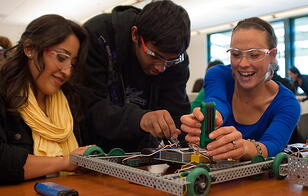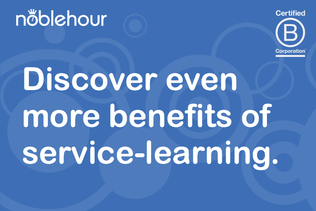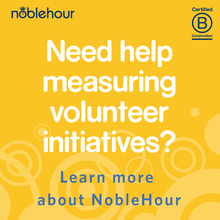This post was written by NobleHour Special Contributor Natasha Derezinski-Choo, a student at Grimsley High School in Greensboro, NC.
The lives and futures of Millennials are shaped by technological and environmental factors that no other generation has faced before. The technological advances that brought computers, cell phones, and the Internet into the homes of everyday people have changed the way we live our lives and interact with others. Changes in population and production have increased the standard of living in some countries, while also increasing the gap between the haves and the have-nots. These economic developments, along with advances in technology, have created a more globalized and interconnected world.
Some of these changes have been positive and others negative, but our ability to meditate on our actions in the context of the future will shape how we expand positive changes and resolve the negative ones. Though the future is uncertain, we can try to use our knowledge of the present to forecast the changes, advances, and difficulties of tomorrow. When we look into the future, we must consider how these changes and movements will shape the social issues that Millennials and future generations will have to confront.
Inequality: Inequality is a difficult problem that has existed throughout history and can manifest itself in a variety of settings. An article published in the Journal of Future Studies by Lorne Tepperman and James Curtis entitled “Social Problems of the Future” explains that “inequality is firmly entrenched in our society” because ideological, religious, cultural, and regional differences are a constant boundary resulting from generations of social rift.  Economic inequality is the most concerning form of inequality because, and as Tepperman and Curtis explain, in a globalized and industrialized world economy, the gap between the developed and developing world presents the greatest boundary to achievig social equality. Tepperman and Curtis predict that inequality is a virtually insoluble problem.
Economic inequality is the most concerning form of inequality because, and as Tepperman and Curtis explain, in a globalized and industrialized world economy, the gap between the developed and developing world presents the greatest boundary to achievig social equality. Tepperman and Curtis predict that inequality is a virtually insoluble problem.
While it may be true that inequality is one of the most challenging and diverse issues of the future, the Millennial generation does possess some of the tools to tackle the problem of inequality. The Pew Research Center’s report “Millennials: Confident. Connected. Open to Change.” found that on the topic of inequality, “[t]he Millennial generation is somewhat more supportive of efforts to ensure equal rights than are members of older age groups.” It is predicted that Generation Z and future generations will be stronger advocates for equality. Given their technological prowess and purpose-driven work ethic, Millennials certainly have the tools, potential, and attitude to reduce inequality in our society.
Environment: Threats to the safety of our environment are a growing problem. The rising global population and limits of earth’s ability to sustain such a large population is a growing concern for the future. While some regions are able to produce surpluses of food and necessities, others face scarcity and famine. The consequences of pollution and green house gas emissions from industrial activity and transpiration are a threat to the environment.  As Tepperman and Curtis explain, “Many scientists and theorists believe that unless changes are made today, environmental problems will become more severe and their consequences more intense in the future. Already, the world’s temperature has increased . . . [leading to] more frequent droughts and famines . . . higher rates of skin cancer, and more extreme weather.” Millennials are responsible for making immediate lifestyle changes that are friendly to the environment. Making these changes today will ensure that future generations will still have a planet they can appreciate and care for.
As Tepperman and Curtis explain, “Many scientists and theorists believe that unless changes are made today, environmental problems will become more severe and their consequences more intense in the future. Already, the world’s temperature has increased . . . [leading to] more frequent droughts and famines . . . higher rates of skin cancer, and more extreme weather.” Millennials are responsible for making immediate lifestyle changes that are friendly to the environment. Making these changes today will ensure that future generations will still have a planet they can appreciate and care for.
Technology: In recent history, technological advances have occurred at one of the fastest rates. From the development of the computer and the Internet to mapping of the human genome, these changes are weighted with both potential and responsibility. In response to recent advancements, Millennials will be faced with redefining ethical boundaries to consider issues such as genetic engineering in humans to internet privacy.  Technology is also widening the amount of information available to people. In the future, it will be important for the next generation to harness technology to make knowledge more accessible, as knowledge is a source of empowerment and a way of reversing inequality. It will also be important to ensure the integrity of information and to make sure that the spread of ideas is not abused and saturated with unreliable or harmful information. In a world of social media, the realms of reality and identity are being challenged, as people are able to redefine themselves in the digital world. It will be important to use these social platforms as a way to increase communication and build healthier relationships rather than become a way of distorting reality and damaging human connection. Future generations will be handed a technology driven world, with the responsibility to use this technology to empower others and solve social issues.
Technology is also widening the amount of information available to people. In the future, it will be important for the next generation to harness technology to make knowledge more accessible, as knowledge is a source of empowerment and a way of reversing inequality. It will also be important to ensure the integrity of information and to make sure that the spread of ideas is not abused and saturated with unreliable or harmful information. In a world of social media, the realms of reality and identity are being challenged, as people are able to redefine themselves in the digital world. It will be important to use these social platforms as a way to increase communication and build healthier relationships rather than become a way of distorting reality and damaging human connection. Future generations will be handed a technology driven world, with the responsibility to use this technology to empower others and solve social issues.
Thinking about the future and trying to foresee its challenges is difficult and inexact task. However, the more we consider how our actions today will affect tomorrow, the more we are able to see that our willingness to implement change and social good will have a direct impact of solving foreseeable problems. Luckily, Millennials value volunteering and purpose-driven work. As one of the most civically engaged and technologically connected generations, Millennials have both the ability and responsibility to create a better world for the future. As Tepperman and Curtis write in their essay predicting issues of the future, “the goal of future studies is only partly to paint a picture of what life may be like for subsequent generations. Its more important task is to imagine a desirable alternative future for people to work towards, a future that is actively shaped by the decisions of people living today.”
Related:
Millennials Look for Meaningful Work
How Service & Service-Learning Spark Social Justice

 our local and global communities
our local and global communities





